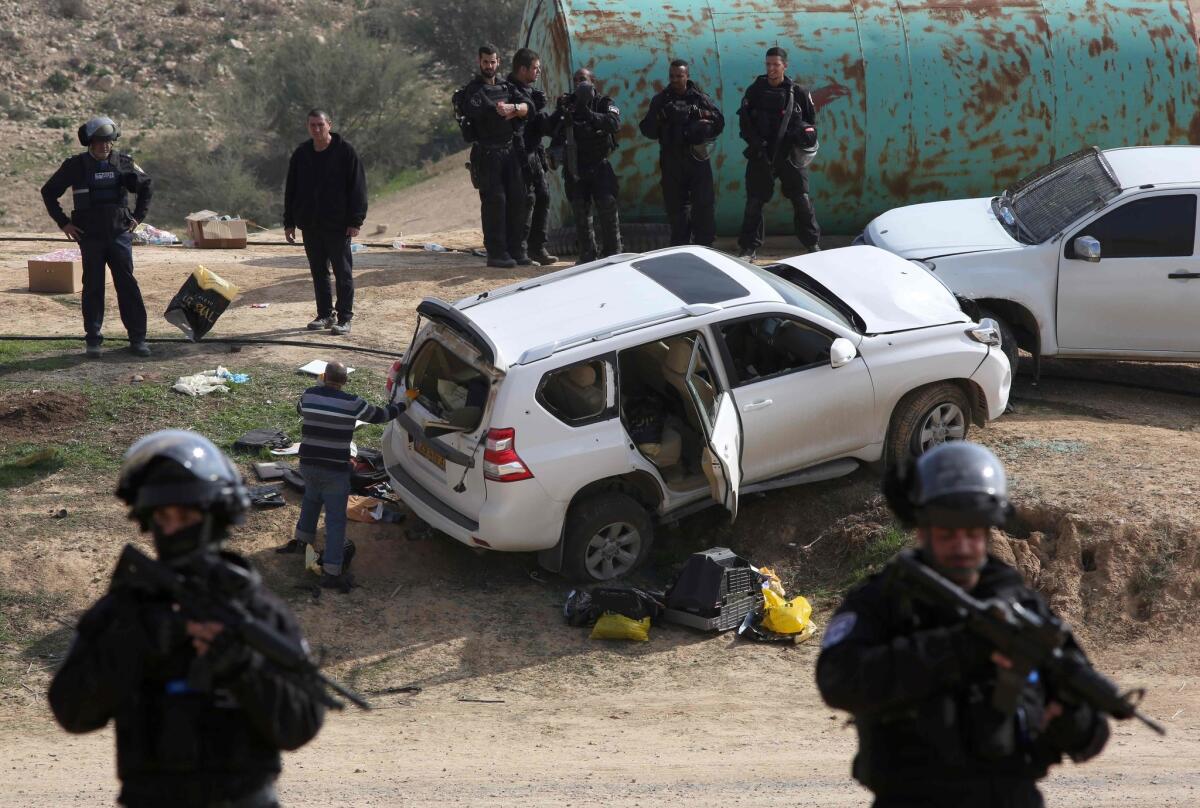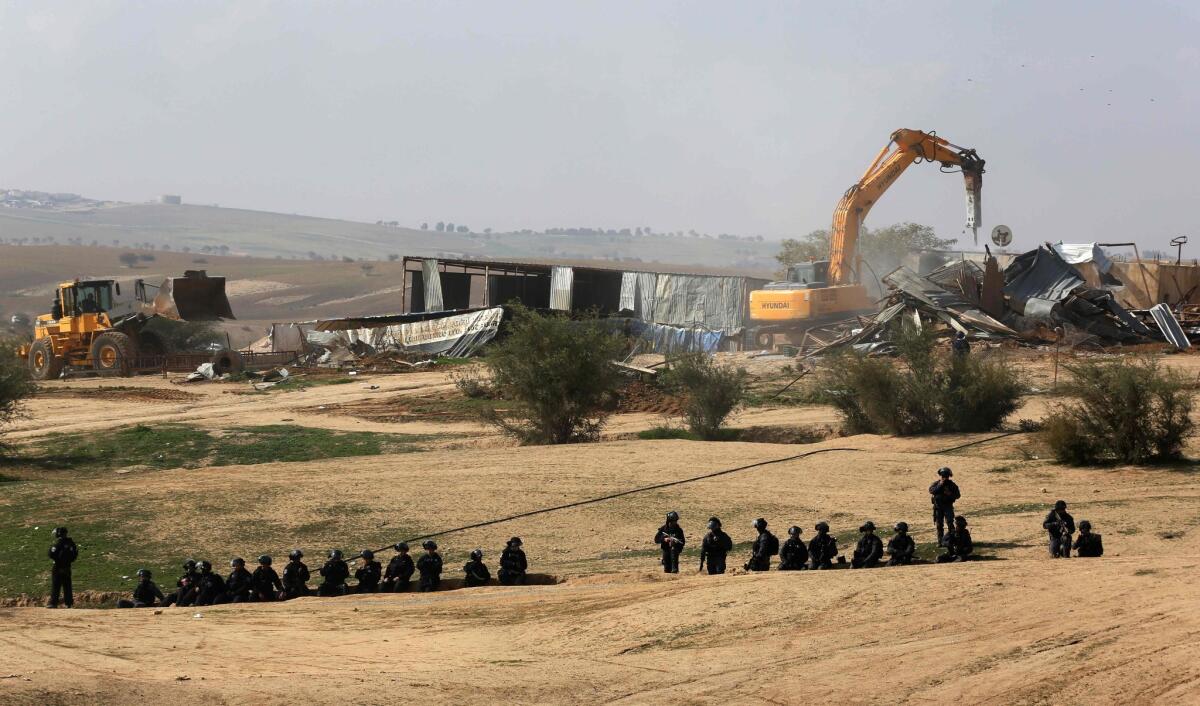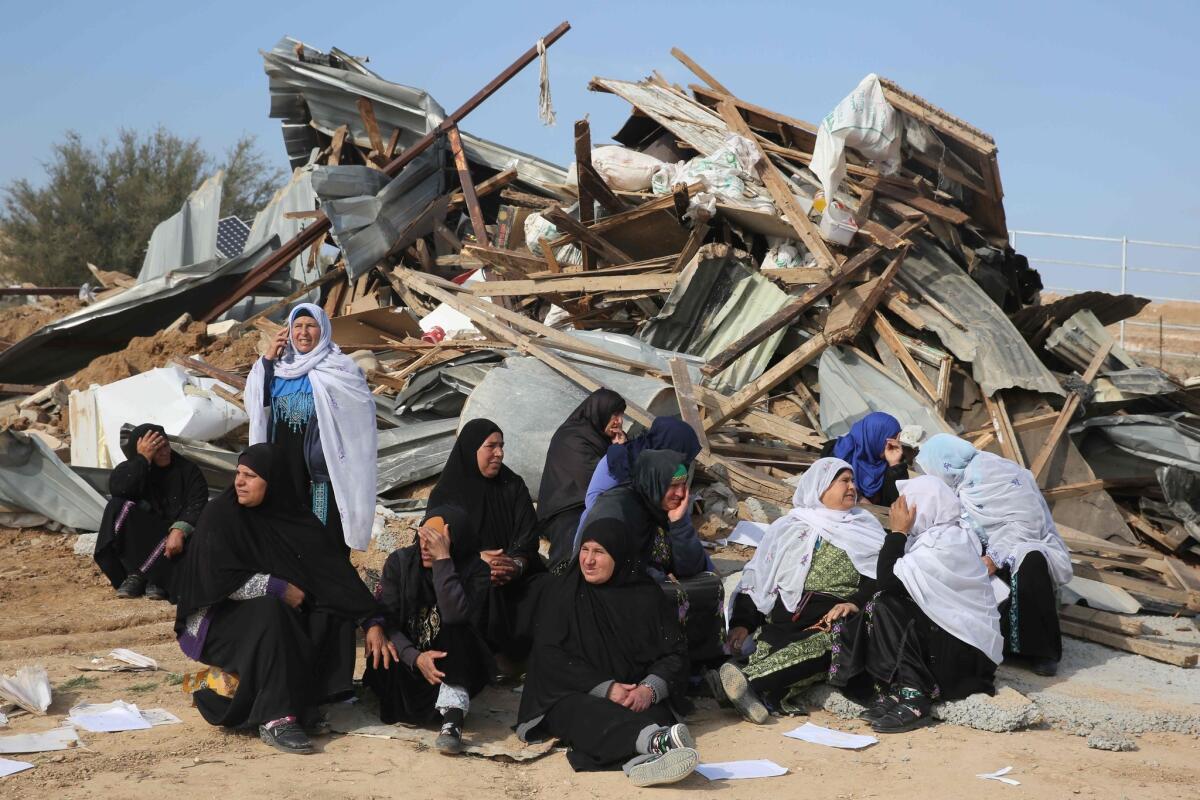Attempt by Israel to bulldoze homes in Bedouin village leads to violence, two deaths
- Share via
Reporting from UM AL HIRAN, Israel — A police operation to demolish about a dozen buildings in the Israeli Bedouin village of Um al Hiran on Wednesday turned violent, leaving a policeman and a village resident dead and inflaming tensions between Israel’s government and the country’s Arab minority.
A convoy of nearly 500 officers arrived at Um al Hiran, one of dozens of Bedouin hamlets not recognized by the government, before dawn to secure the demolition, firing stun grenades, flares and tear gas as they ordered residents to leave dwellings slated for destruction. What ensued was disputed by police and residents.
In what Israeli authorities described as a terrorist attack, Yakub Qian, whose house had been slated for demolition, plowed his white Land Cruiser jeep through a crowd of police officers that had gathered on the village’s outskirts, killing Sgt. Maj. Erez Levi and injuring another policeman. Qian, who police said was a member of Israel’s Islamic Movement, was shot and killed by police.
“The purpose of a person that speeds in a car in the direction of a group of policemen is to kill them,” Assistant Commissioner Peretz Amar, deputy southern district police commander, told reporters. “I have no other definition for this, other than an attack. It’s clear.”


Villagers and human rights activists disputed the police account, saying that a policeman fired on Qian, a math teacher, without provocation while he was driving, causing him to lose control of the jeep. “They were shooting at him [first], and then [the jeep] rolled down very quickly,’’ said Michal Haramati, a human rights activist standing nearby. “As the car was going down the hill, there were police officers there and they got hit.”
Video of the incident shot from a helicopter overhead shows the jeep traveling slowly while one policeman a few feet away unleashes at least two bursts of fire. The vehicle then accelerates down the hill, plowing through the policemen, and then swerving into a sharp right turn before colliding with a police car.
It was the second time this month that Israeli security forces were run down by a vehicle with an Arab resident at the wheel. On Jan. 8, a Palestinian truck driver from East Jerusalem ran into a group of soldiers at a tourist promenade, killing four, in what Israeli leaders called an attack inspired by Islamic State.
“This is the second ramming attack in several days,” Israeli Prime Minister Benjamin Netanyahu said. “We are fighting against this murderous phenomenon that strikes both in Israel and throughout the world.”
Arab members of Israel’s parliament accused Netanyahu and his right-wing government of engaging in a deliberate crackdown against Arab towns with unauthorized buildings. Last week about one dozen buildings were demolished in the central Israel Arab village of Kalanswe.
Facing legal pressure to evacuate a group of several hundred settlers in December, the prime minister ordered a crackdown on illegal Arab buildings.
Um al Hiran is one of about three dozen Bedouin villages not recognized by the Israeli government sprawled throughout southern Israel’s Negev desert. They are home to about about 70,000 residents. Israeli officials have held several rounds of unsuccessful negotiations with community leaders to relocate them into several townships and give compensation to Bedouin with landownership claims.
Um al Hiran, established in the 1950s by Israeli military authorities, has become a tinderbox in the dispute over the unrecognized villages because residents waged a legal challenge against a government plan to evacuate them to make way for a Jewish town in the same place. After losing a Supreme Court appeal in 2015, villagers have been negotiating with the government to relocate residents to a nearby Bedouin township. The negotiations broke down late Tuesday night.
“It was possible to reach an agreement, but the prime minister had a different plan,” said Ayman Odeh, an Arab parliament member, who said he was hit by a foam-tipped bullet during Wednesday’s altercation. Odeh was briefly hospitalized and returned to the village with a bandage around his head.
“The prime minister decided that the Arab population is the No. 1 enemy,” he said. “That’s why he led the demolitions here.”
Arabs accuse the government of a double standard — of tolerating unauthorized settlements established by Jews, while targeting those built by Arabs.

On Wednesday, several hours after the deaths, bulldozers and heavy trucks tore apart several buildings on the outskirts of Um al Hiran while police cordoned off the village from Arab politicians and bystanders from the neighboring Bedouin town of Hurra. After the demolition was over, Bedouin relatives gathered amid the twisted rods and concrete wreckage left behind.
Fouad Qian denied that his brother, the man killed by Israeli police, had attacked officers.
“[Yakub] was supposed to be in school and they came and killed him,” said Fouad Qian, 36. “We are living in a war. They are treating us like a soccer ball, and kick us wherever they want. They tell us this is illegal. We’ve been here for 60 years.”
Mitnick is a special correspondent.
ALSO
Nikki Haley slams U.N. ‘bias’ against Israel in her Senate hearing
Defeated dictator clings to power in Gambia as African leaders mull how to save democracy
Myanmar groups call for independent probe into alleged abuse of Rohingya Muslims
More to Read
Sign up for Essential California
The most important California stories and recommendations in your inbox every morning.
You may occasionally receive promotional content from the Los Angeles Times.










